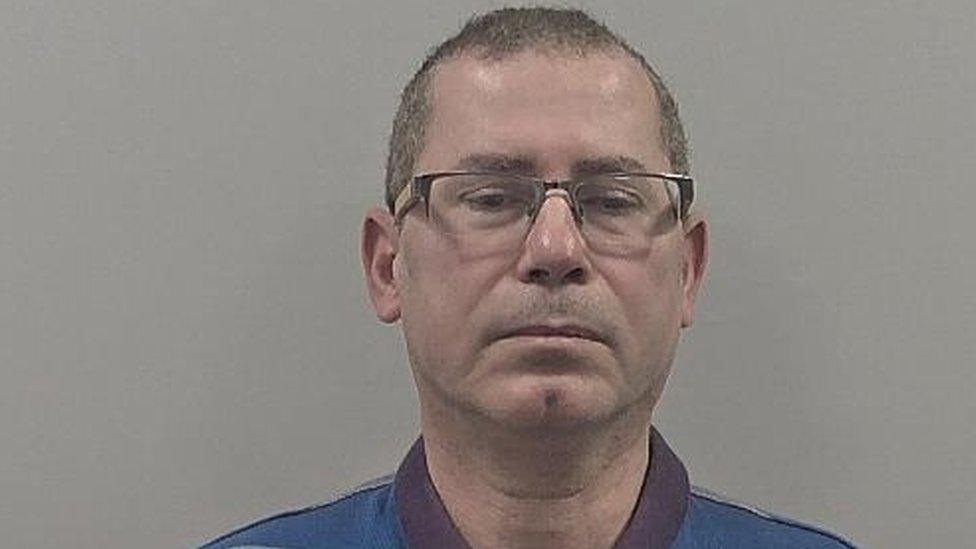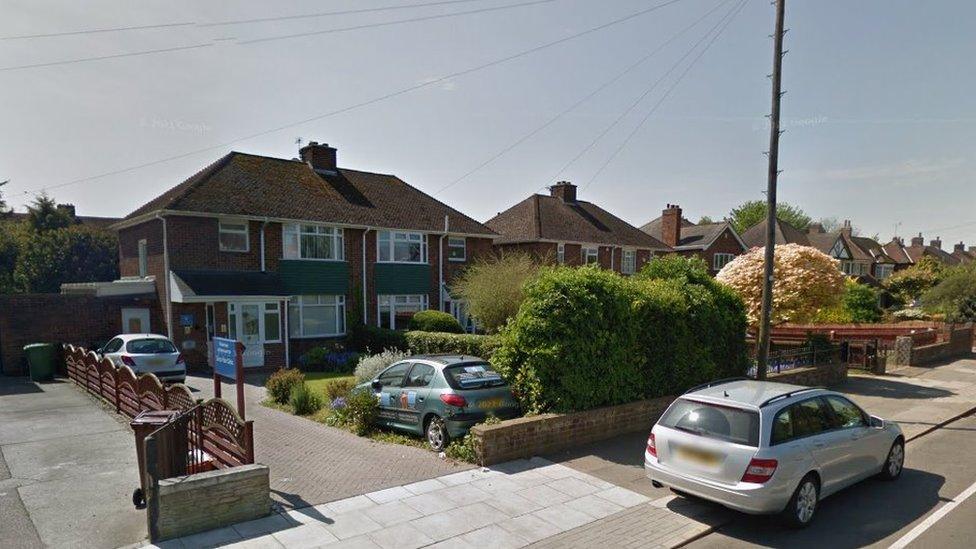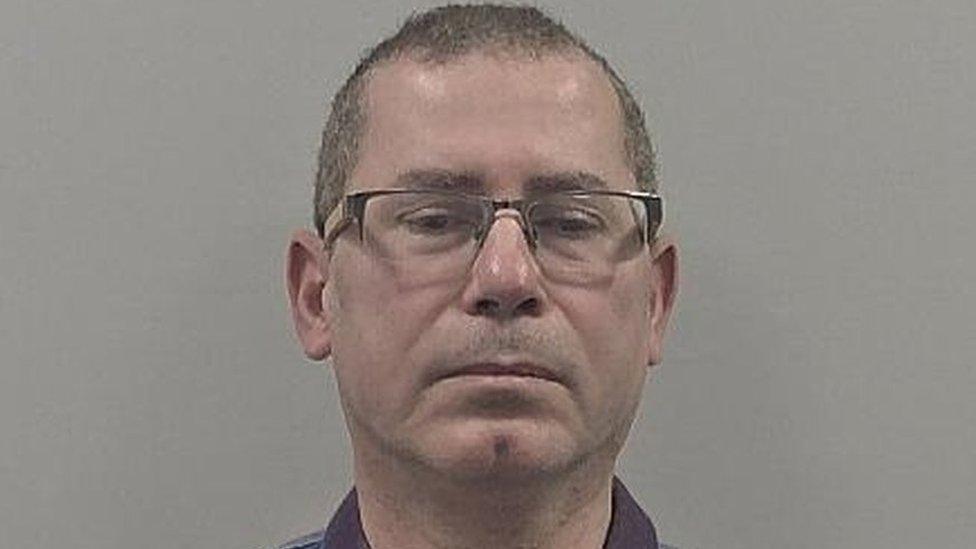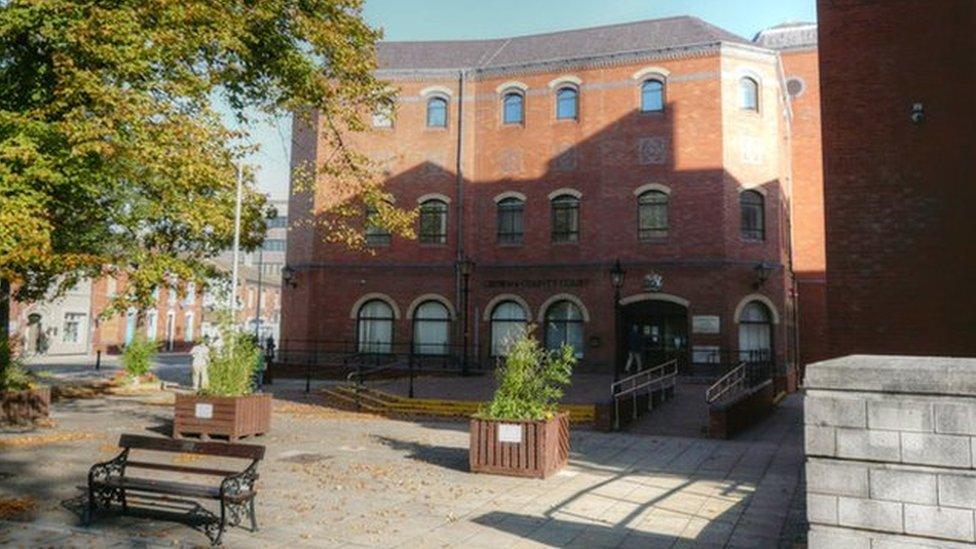Hossam Metwally: How doctor's 'bizarre' exorcism trial unfolded
- Published

Hossam Metwally recorded himself performing alleged exorcism rituals on his drugged partner
Hossam Metwally has been sentenced for poisoning his partner during a series of exorcism ceremonies which left her on the brink of death. The doctor's trial, which could not be reported until its conclusion, over his "dangerous perversion" of the Islamic ruqya ritual was described by a judge as one of the most "bizarre" cases to ever come before him.
A sobbing, clearly distressed woman is tied to a bed as a man looms over her, chanting.
What could be mistaken for a scene from a horror film was, in this case, all too real. And, for four years, Kelly Wilson was subjected to the terrifying ordeal by her partner, Dr Hossam Metwally.
Metwally had convinced vulnerable Ms Wilson, almost 30 years his junior, that her chronic pain was caused by jinns - supernatural spirits found in Muslim folklore.
In what was described as a "dangerous perversion" of the ruqya - an Islamic cleansing ritual - Metwally would pump Ms Wilson with potentially lethal painkillers and sedatives before performing actions which had the trappings of spirituality but bore little resemblance to most Muslims' understanding of the ancient tradition.
The ceremonies performed by Metwally, a 61-year-old NHS anaesthetist and chronic pain specialist who qualified in his native Egypt, came to a disastrous halt in 2019 when Ms Wilson, 34, was found catatonic and suffering from multiple organ failure.
As detectives began to unpick the case, they would find Metwally had obsessively chronicled the acts, recording dozens of disturbing videos that would later be shown to a jury and ultimately seal his fate.
Judge Jeremy Richardson QC, who presided over Metwally's eight-week trial at Sheffield Crown Court, told jurors he had "never been involved in a more bizarre case" in his 41-year legal career - it was one that had left him mystified.

Hossam Metwally had a "vast stock of drugs" at his Grimsby home
Metwally and Ms Wilson met in Grimsby in late 2014 while she, 27 at the time, was training to be a nurse. She was in her final year of university and he had given her drugs for her back pain. Within months, she began working at his private pain clinic in the Lincolnshire town, booking patients and assisting him with managing his stock of medicines. She later moved in with him at his home in Laceby Road.
Ms Wilson's family welcomed the doctor, whom they called Sam. Her father, Ian, described him in court as "pleasant but strong-willed". The couple had a "religious blessing ceremony" - essentially an unofficial marriage - and it was Ms Wilson's first long-term relationship.
In court she was presented as a troubled young woman, lonely and with a history of depression. She suffered a string of illnesses, and when her health deteriorated, she eventually quit her nursing job and relied heavily on prescriptions including fentanyl, oxycodine and tramadol for pain relief.
Messages between Metwally and Ms Wilson revealed how she "craved" medication and that her partner was willing to fulfil her demands by writing prescriptions issued under her name and those of her family members.
Within 12 months of their relationship forming, Metwally began to perform rituals upon Ms Wilson. He told his trial he came to believe she was possessed after she reacted angrily upon hearing the Islamic call to prayer on three occasions. He claimed he watched a "beautiful nice girl become a monster who wanted to attack me".
He blamed the alleged change on jinns - supernatural creatures which feature in early Islamic mythology. He told the trial judge of his belief that these "parallel spirits... inhabit Earth, our world, and they live within our houses. They live everywhere."
Armed with this apparent belief, Metwally would go on to perform 276 of his version of the ruqya on Ms Wilson. Extracts of 200 videos were played in court, and showed him pumping drugs into Ms Wilson - either via a cannula, syringe or drops - while chanting "Bismillah" and other words or Hadith from the Koran.

Metwally had been supplying and administering a range of anaesthetic drugs to his partner, the Crown Prosecution Service said
Ms Wilson was not his first subject. He had performed hundreds of rituals, including some in his native Egypt. Where he lacked formal knowledge of the practice, he made up for it by playing recorded versions from YouTube - most of them focused on supernatural concepts such as "black magic and the evil eye".
The distressing clips of his sessions with Ms Wilson portray a poorly victim who can be seen crying and whimpering. In some she is restrained. In others, she is heard shouting "it's burning inside" and spitting in Metwally's face before he slaps her forehead in response. On one occasion she can be heard to say that she wants to die, adding: "I don't want to live like this… You don't know what you've done to me...".
The scenes are reminiscent of a Hollywood film, rather than the serene image of a "true" Islamic ruqya. Metwally can be heard to appeal to a cast of jinn with names such as King Mustafa, Robert, Juliana, Sabine and Adam. He had insisted his aim was to "help the jinn to come out of the mouth without hurting Kelly". But, as the clips play out one-by-one, the acts become more intense.
In one of the most disturbing videos, filmed in May 2016, Ms Wilson is tied to the bed and, after she is revived with smelling salts, asks Metwally: "Have you raped me?". She then accuses Metwally of drugging and assaulting her, and requests the police.
But it would be another three years until his arrest in July 2019. Metwally had found Ms Wilson comatose, but it was her bewildered father, not the experienced medic, who suggested calling 999 when he was informed of his daughter's condition via text. When paramedics arrived at the couple's home, they were unnerved by Metwally's cool composure. They felt "no sense of urgency" from him despite his partner's perilous state. Ms Wilson's face had turned blue. Medics also found a yellow cannula of fluid running into her right shoulder and a "mottled" abdomen indicative of organ failure.

What is ruqya?

Imam Abdullah Hasan: "Ruqya is more a spiritual belief and not a substitute for a person who is suffering from real problems"
Abdullah Hasan, an imam and counsellor in London, said ruqya was a valid practice but would never involve drugs or "chemical potions".
"Essentially it means spiritual healing through the Koran, through the recitation of the Koran, and through the Hadith or the statements and sayings of the prophet Muhammad - peace be upon him - or through remembering God, through his names and attributes.
"Whenever I go to the mosque and the Imam has beautifully recited the Koran I feel at peace, I feel calm. I feel a sense of repose in my heart, in my mind I feel more focused, I feel less anxious."
Imam Hasan, who is based at the Al-Emaan Centre in Bromley, Kent, said ruqya is misunderstood and rejected myths of "spells, magic wands or hocus pocus" being involved. But he said there was a tendency for vulnerable individuals to fall prey to those fraudulently claiming to perform ruqya.
He described Metwally's practice as "not Islamic" and urged people with health problems not to rely solely on spiritual remedies or alternative medicine. "If a person is concerned about their well being, whether it's physical or psychological, then go to a doctor, counsellor or therapist - that should be the first point of call," he said.
"In my experience, a lot of people who allege or claim that they are possessed by jinns - most of them have psychological problems, psychological difficulties, and they need to [seek professional] therapy.
"Ruqya is more a spiritual belief and not a substitute for a person who is suffering from real problems."

At hospital, doctors found Ms Wilson had in fact suffered multiple organ failure due to the administration of drugs. They were at a loss to understand why Metwally had put off seeking help for so long.
This aspect of the evidence threatened to derail the trial at one point, when a juror collapsed with an apparent seizure in the courtroom while anaesthetist, Dr Julian Brown, was giving expert evidence. It prompted the consultant to run from the witness box to provide assistance as he urged court staff to call an ambulance. In contrast, Metwally did not respond; in the same way he had failed to immediately summon paramedics for his comatose partner. Defence lawyers argued, unsuccessfully, that his inaction in the courtroom would prejudice the jury's view of his character.
After Ms Wilson's hospital admission, police were alerted, and found a "vast stock of drugs" at Metwally's home, including ketamine, propofol, liquid fentanyl and diazemuls. Their investigations also uncovered the recordings of the exorcism rituals, and the lengths he went to in exploiting his vulnerable partner.
At trial, prosecutors said "charlatan" Metwally had abused his position to gain Ms Wilson's trust, and through feeding her drug addiction "rendered her into such a state that she forfeited all control over her body to him".
Despite the vast evidence against him, Metwally denied wrongdoing and insisted he had only used holy oils in his efforts to cure Ms Wilson of her possession by jinns.
The jury took less than 90 minutes to reach unanimous verdicts. He was found guilty of eight charges, including administering a noxious substance and a count of fraud. Following his conviction, the doctor admitted two further unrelated charges of voyeurism, allowing the judge to lift reporting restrictions.
As he came to sentencing Metwally, Judge Jeremy Richardson QC, branded him a "disgrace" who "perverted medical practice for your own ends".
"You are also not a very good doctor because, in these perverted practices, you very nearly killed the woman you said you loved," he said.

- Published6 August 2021

- Published5 August 2019
